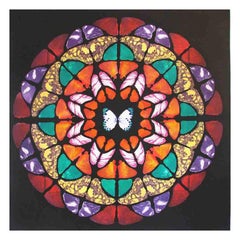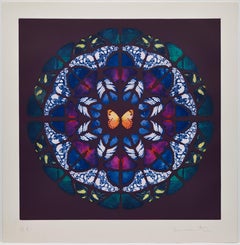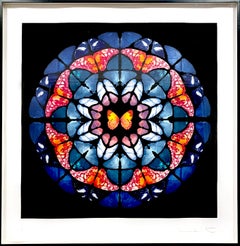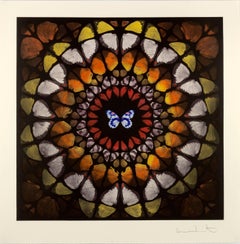Damien Hirst Sanctum
21st Century and Contemporary British Contemporary Art
Canvas
Early 2000s Contemporary Prints and Multiples
Etching
Recent Sales
21st Century and Contemporary Young British Artists (YBA) Prints and Mul...
Etching
Early 2000s Young British Artists (YBA) Prints and Multiples
Etching
People Also Browsed
2010s Dutch Modern Side Tables
Resin
Antique Mid-19th Century English High Victorian Taxidermy
Other
2010s Italian Minimalist Tableware
Murano Glass
21st Century and Contemporary Portuguese Modern Sofas
Velvet, Walnut
21st Century and Contemporary Mexican Mid-Century Modern Table Lamps
Fiberglass, Linen, Fabric, Wood
21st Century and Contemporary Italian Modern Table Lamps
Resin
21st Century and Contemporary Swedish Scandinavian Modern Wall Lights an...
Metal
2010s French Modern Chairs
Fabric, Satin, Oak
21st Century and Contemporary Italian Mid-Century Modern Chandeliers and...
Brass
21st Century and Contemporary Mexican Mid-Century Modern Floor Lamps
Textile, Wood, Linen, Fiberglass
2010s American Modern Table Lamps
Brass
2010s American Ottomans and Poufs
Velvet
21st Century and Contemporary Italian Modern Cabinets
Wood
Antique Late 19th Century British Victorian Taxidermy
Organic Material
2010s Animal Prints
Foil
21st Century and Contemporary European Victorian Taxidermy
Animal Skin
Damien Hirst for sale on 1stDibs
British artist Damien Hirst is widely considered the enfant terrible of contemporary art. He is the most prominent of the so-called Young British Artists, or YBAs, a group, largely composed of Hirst’s classmates at Goldsmiths, in London, that began exhibiting together in warehouses and factories after 1988 and is known for the use of unconventional materials and “shock tactics” in his paintings, prints, sculptures and other works.
In the 1990s, Hirst said, “I can’t wait to get into a position to make really bad art and get away with it.” And indeed, he is notorious for piquing critics and baffling the public with such pieces as his signature glass vitrines containing dead sheep or sharks in formaldehyde, and his diamond-encrusted skull, For the Love of God.
Working primarily in sculpture, Hirst takes after French modernist master Marcel Duchamp in his use of ready-made objects and materials, which he combines to ironic effect. He often creates in series, as with "The Cure (Violet)" and "The Cure (Turquoise)," both from 2014, which are among several pill paintings referencing Andy Warhol’s embrace of mass production.
Belonging to Hirst's ongoing series of “spot” paintings, begun in the 1980s, the 2005 piece Xylene Cyanol Dye Solution is striking for its machinelike, industrial uniformity and almost childlike simplicity, a seeming rebuke to the idea of the artist-as-genius.
In addition to making art, Hirst has launched stores that sell editioned works (Other Criteria), a restaurant (Pharmacy2) and even his own London museum (Newport Street Gallery).
Find original Damien Hirst paintings, prints and other works on 1stDibs.
Finding the Right Prints And Multiples for You
Decorating with fine art prints — whether they’re figurative prints, abstract prints or another variety — has always been a practical way of bringing a space to life as well as bringing works by an artist you love into your home.
Pursued in the 1960s and ’70s, largely by Pop artists drawn to its associations with mass production, advertising, packaging and seriality, as well as those challenging the primacy of the Abstract Expressionist brushstroke, printmaking was embraced in the 1980s by painters and conceptual artists ranging from David Salle and Elizabeth Murray to Adrian Piper and Sherrie Levine.
Printmaking is the transfer of an image from one surface to another. An artist takes a material like stone, metal, wood or wax, carves, incises, draws or otherwise marks it with an image, inks or paints it and then transfers the image to a piece of paper or other material.
Fine art prints are frequently confused with their more commercial counterparts. After all, our closest connection to the printed image is through mass-produced newspapers, magazines and books, and many people don’t realize that even though prints are editions, they start with an original image created by an artist with the intent of reproducing it in a small batch. Fine art prints are created in strictly limited editions — 20 or 30 or maybe 50 — and are always based on an image created specifically to be made into an edition.
Many people think of revered Dutch artist Rembrandt as a painter but may not know that he was a printmaker as well. His prints have been preserved in time along with the work of other celebrated printmakers such as Pablo Picasso, Salvador Dalí and Andy Warhol. These fine art prints are still highly sought after by collectors.
“It’s another tool in the artist’s toolbox, just like painting or sculpture or anything else that an artist uses in the service of mark making or expressing him- or herself,” says International Fine Print Dealers Association (IFPDA) vice president Betsy Senior, of New York’s Betsy Senior Fine Art, Inc.
Because artist’s editions tend to be more affordable and available than his or her unique works, they’re more accessible and can be a great opportunity to bring a variety of colors, textures and shapes into a space.
For tight corners, select small fine art prints as opposed to the oversized bold piece you’ll hang as a focal point in the dining area. But be careful not to choose something that is too big for your space. And feel free to lean into it if need be — not every work needs picture-hanging hooks. Leaning a larger fine art print against the wall behind a bookcase can add a stylish installation-type dynamic to your living room. (Read more about how to arrange wall art here.)
Find fine art prints for sale on 1stDibs today.
 David Brooker Fine ArtMay 13, 2021Large oils are worth many millions of dollars. The value would depend on the size, composition and importance of the piece
David Brooker Fine ArtMay 13, 2021Large oils are worth many millions of dollars. The value would depend on the size, composition and importance of the piece



